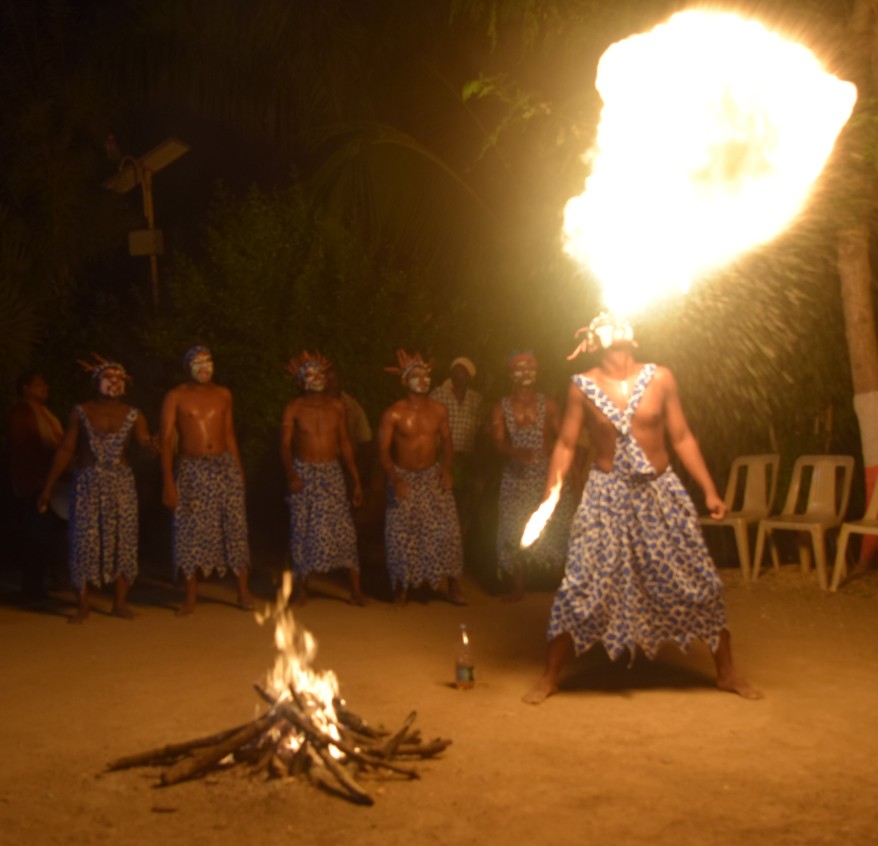Siddis: A Tribe Lost In The Pages Of History
What are the chances of meeting an Afro-American who can speak Hindi, knows which part of the country Indian prime minister hails from and claims to have a great grandfather from Gujarat too? I would say none except that I met someone just like that on my maiden trip to USA at Times Square, New York, of all the places!
I had then, laughed off his claim as a gimmick to get friendly with us and sell the city bus tour package.
A year later I was at the inner gate of Gir National park that led to safari trail inside and there in the thick of jungle was a cluster of brick and thatch huts solely occupied by what seemed like a group of Africans.
At the resort that evening, I was surprised to see bare torso fire-breathing men, dancing to drum beats and some strange words that had only faint semblance to an African tribal music. They had their black faces painted in red, blue and white zig-zag lines; heads crowned with straws sticking out of a mosaic print blue bandanna and wore a matching blue mosaic print skirt.
Those men belonged to a Siddi tribe with its roots in Africa. Settled in a small village, Sirvan, skirting the only abode of Asiatic lion at Gir national Park, they lead an obscure life doing odd jobs as drivers, mechanics or labourers coming in limelight only during tourism season of October to June when they are asked to perform by the nearby resorts to entertain the guests.
“This is our fourth generation born and brought up here in Gujarat” Hamza, a young performer told me when his group was performing one evening at the resort.
With only their physical features reminding them of their ethnicity, all families of Sirvan village have completely adapted to Gujarat, eating Gujarati food with as much relish and communicating in local language as much fluently. Separated from their roots for more than three centuries, they strive to keep their music and dance rituals alive but now it has only little traces of the Goma Music of Africa. The dance performances at the resorts seem more like buffoonery meant to elicit laughter and that extra fifty or hundred rupees tip from the tourists and most youngsters of the tribe do not even know the meaning of the certain African words of the songs they dance to.
Siddis, descendents of Bantu tribe of Africa were also called ‘Habshis’. The term may have been derived from Al-Habsh, Arabic for Abyssinia. They were brought on Indian soil as slaves and soldiers. Some Siddis broke the shackles of slavery to establish their small provinces in some parts of Maharashtra, Hyderabad and Karnataka. The Siddis residing near Gir Forest are the descendents of slaves brought by Portugese for the Nawab of Junagarh. The members of this tribe settled now in different parts of India still struggle today to call a piece of land their own.
As he went about collecting tips from all the guests at the resort that night after the ‘Goma’ musical dance and fire breathing performances were over, Omar the wise elderly man of the troupe commented as a matter of fact “History has forgotten us…”
I sat wondering about the complex relationship of these original expatriates with India….As if reading my thoughts he joined his hands in a last Namaste of the evening and told me simply…“There is nothing for us in Africa now…India is our country; it is our home and all our people are here!”


Really interesting and informative 🙂
LikeLiked by 1 person
Thank you Aishwarya. Glad you liked it.
LikeLiked by 1 person
Nice research! It proves the archaic and disputed theory that Adam was from Africa. But, it’s really intriguing that they traveled this far during those days!
Loved it!
LikeLiked by 1 person
Thank you Rakesh. I read somewhere that some tribes of India have genes from Africa. Yes it is interesting to know that people travelled to such far areas but then Mughal empire did extend till present day Afghanistan .
LikeLiked by 1 person
Super Shoma… loved the piece… 🙂
LikeLike
Thank you so much Archana. Glad you liked it.
LikeLike
Wow. I was not aware of this. Thanks for sharing..:)
LikeLike
Me too..when I visited Golconda fort in Hyderabad, I saw barracks for ‘Habshi’soldiers ie for Absynnian soldiers but only after visiting Gir could I connect the term. I also read in a piece once that guerilla warfare was taught by one such African to Shivaji and the Maratha soldiers.
LikeLike
Quite interesting!
LikeLike
yes…thank you
LikeLike
Nice piece on Siddiis;certainly quality education will get them to main stream when they will start working on Metros etc..
LikeLiked by 1 person
Thank you. They are making gradual progress…
LikeLike
So! The Saga of Migration continues.
Nice Post.
It is always interesting to visit your blog something good is always there.
Wont you visit mine.
I hope there is some stuff for you waiting.
Regards,
Shiva
LikeLiked by 1 person
Thank you for kind words. I am glad you find my blog interesting. Sorry I have been little lazy in visiting blogs. I will definitely visit. Thanks again.
LikeLike
As an American, I have no family traditions like these and no culture to come from. Its sad to know we live in a world that committs such horrible acts against humanity. I’m glad to read they are capable and willing to honor their ancestors traditions. Its a beautiful performance!
LikeLike
Thank you. Traditions are definitely a means to stay connected with our roots. However in this age of technology and short attention spans, who knows what all traditions will be lost to mankind.
LikeLiked by 1 person